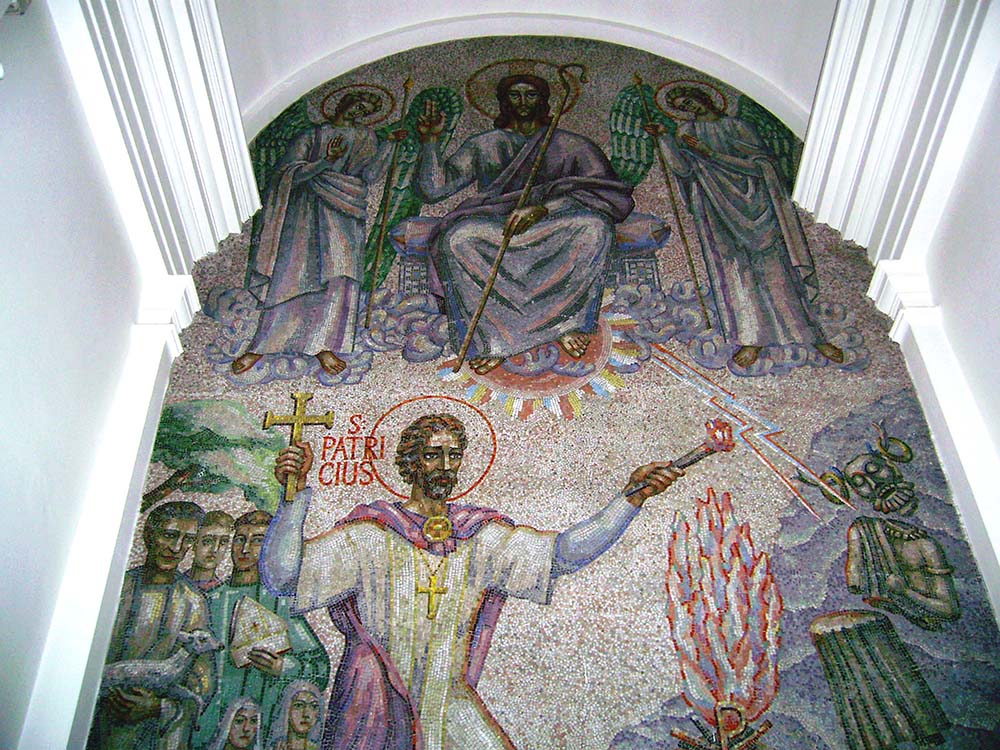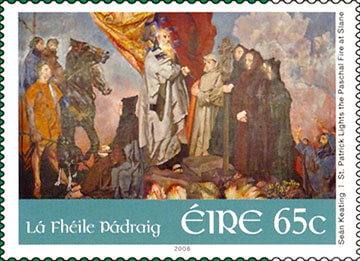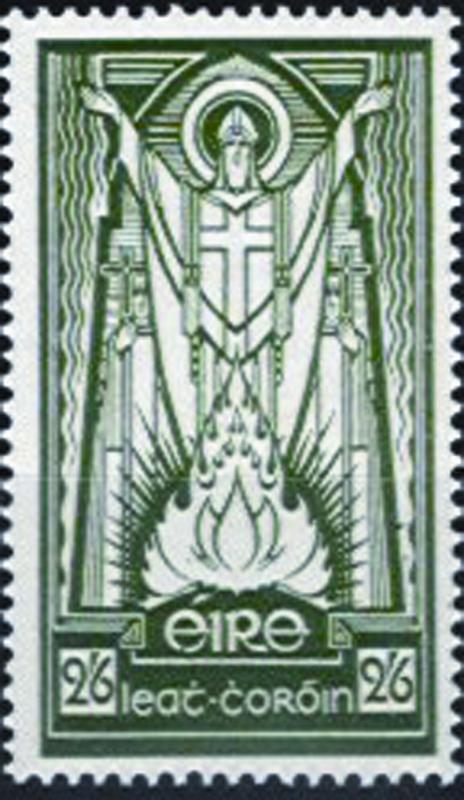Saint Patrick (385-461): The Impact Of One Life
By Hallie Riedel
St Patrick is the patron saint of Ireland and of Nigeria. His Feast Day is 17 March, Ireland’s National Holiday.We thank The Word of Life, www.wau.org , for this article. Hallie Riedel is a Contributing Writer for that magazine, published in the USA but also available in a Philippine edition. She is married and has three children.

St Patrick lighting the Paschal Fire in Slane
Mosaic by Boris Anrep, Christ the King Cathedral, Mullingar, Ireland
What can an indolent, self-absorbed teenager have to do with God's plan for evangelizing a nation? Sixteen-years-old and from a well-to-do family, this kid has never applied himself to his studies, let alone taken his Christian faith seriously. And yet, through one of those dramatic reversals of fortune that God sometimes allows, the sluggish youth meets the Lord and goes on to become Ireland's great evangelizer, Saint Patrick.
Patrick himself tells the story in his moving Confession. Unlike the many legends that sprang up after his death, this authentic account of his conversion and development is a window into the life of a real person. In it, Patrick speaks honestly of his regrets, struggles, and successes, and always in a tone of heartfelt thanks that ‘the Lord had mercy on me thousands and thousands of times.’ In this fifth-century bishop, we touch the faith of someone who threw himself completely on God's love - someone who inspires our own faith that, if we accept it, divine love can transform and equip us for God's service, too.
Learning to Listen

There is much that Patrick never thought to include in his Confession - so much that one biographer compared the saint's story to a jigsaw puzzle with all the important pieces missing! We do know that Patrick was born in Roman Britain to well-to-do parents who were Christian, but not especially religious. Turbulent upheavals took place during his lifetime (about 385 to 461), most notably the barbarian invasions and the collapse of the Roman Empire in the West.
Young Patrick's privileged lifestyle came to a sudden end around 401, when he was kidnapped by marauding raiders. They took him to Ireland, where he was enslaved for six years. Patrick came to view this apparent tragedy as the best thing that ever happened to him. Left alone to shepherd flocks, without shelter and without comfort, he turned to God and learned to pray: ‘I would pray all the time, right through the day. More and more, the love of God and fear of him grew strong within me, and as my faith grew, so the Spirit became more and more active. . . In snow, in frost, in rain, I would hardly notice any discomfort.’
As his prayer life deepened, Patrick learned to rely on God and listen for the voice of the Holy Spirit. Through dreams, God assured him that he would return home. He even directed him to the particular ship that would take him there. ‘Not that it was near at hand,’ Patrick wryly remarked. ‘Rather, it was two hundred miles away, in a place I had never seen before and where I knew not a single soul.’ Nevertheless, Patrick obeyed, made good his escape, and found the ship, just as the dream had foretold.
But the testing of Patrick's faith continued, as the captain refused to let him aboard. Patrick's response? ‘I decided to go back to the little hut where I had been staying, and on the way there, I began to pray.’ His confidence in God was rewarded almost immediately: ‘Before I could even get my prayers into focus I heard one of the sailors call after me, “Come, hurry!”’
At the captain's entreaty, Patrick also had occasion to exercise his faith in a more public way. Food ran out after the ship landed in some ‘deserted country,’ perhaps Gaul (modern France), where Germanic hordes had recently sacked and ravaged the land. ‘Turn trustingly to the Lord who is my God,’ was Patrick's advice. ‘Put your faith in him with all your heart, because nothing is impossible to him.’ Suddenly, dinner came walking down the path in the form of a herd of pigs.
The Joy of Obedience
Once back in Britain and reunited with his family, Patrick could easily have fallen back into his old, comfortable patterns. But he had changed for good.
More dreams came. In the first, an Irish messenger handed Patrick one of ‘countless letters’ he was carrying. Reading its opening words – ‘The Voice of the Irish’ - Patrick heard voices crying, ‘We beg you, come back and walk once more among us.’ The plea pierced his heart, inspiring both a love for the people who had been his captors and the conviction that God had work for him in Ireland.
It was not with grim resignation that Patrick decided to return to the land of his enslavement. On the contrary, God's call filled him with joy and astonishment that ‘after so many hardships and great burdens, after my captivity, after so many years spent living among this people that [God] should grant me so great a grace - something which, as a boy, I could never have hoped for or even dreamt possible.’
In 432, after ordination and years of preparation about which little is known, Patrick returned to Ireland. This time he came as a bishop, not a slave.
Through Many Dangers
St Patrick lighting the Paschal Fire, symbol of the Risen Christ
Patrick was not the first to carry the gospel to Ireland, but it was through his tireless efforts that Christianity really took hold there. During his thirty-year ministry, he made thousands of converts, established churches, founded monasteries, and developed native clergy. Humbly amazed at this success, he attributed everything to God's grace.
It is impossible to know which of the legends about Patrick are historically accurate. Very likely, his preaching brought him into confrontation with local kings and Druid priests. Sometimes, even Christians opposed him, as some of the British did when Patrick excommunicated Coroticus, a Welsh prince. In his Letter to the Soldiers of Coroticus, Patrick rails against this supposed Christian's enslavement or slaughter of a number of newly baptized Irish Christians, the chrism ‘still gleaming on their foreheads.’ Patrick urged the British bishops to join him in ostracizing Coroticus, so as to stir him to repentance and restitution. How they responded is unknown.
Patrick was acutely aware that he was accomplishing his mission at the risk of his life. Twelve unspecified ‘dangers,’ slavery, and ‘numerous plots’ were only a few of the perils from which God saved him. ‘Daily I expect murder, fraud, or captivity, or whatever it may be; but I fear none of these things because of the promises of heaven. I have cast myself into the hands of God Almighty.’
Only obedience to God's call had brought him back to Ireland, Patrick said. Secure in the knowledge that he was exactly where God wanted him, he could work without fear.
A Culture Transformed
The fruit of Patrick's obedience showed itself not only in the astounding growth of the Irish church itself, but also in its transformation of Irish culture through the influence of the gospel.
The practice of human sacrifice was abandoned. By the sixth century, slavery had become unacceptable. New Christian laws reduced warfare. Monasteries built extensive libraries where Irish scholarship flourished. Within a century after Patrick's death, the Irish devised the Celtic alphabet. They learned Latin, Greek, and some Hebrew. They translated or copied Irish folklore and Christian writings, and also the classics of Greek and Roman literature. Without this, many of these works would have been lost forever.
The gospel sanctified Ireland's existing native culture, rather than bringing about its eradication. In a way that had rarely happened elsewhere, God's word at work elevated the people and their way of life. One example is the Irish love of nature, which was lifted from its pagan, Druid setting to a higher plane. We see this in the prayer which is often called Saint Patrick's Breastplate. Here, the Christian creed expands and combines with themes such as God's presence in creation, the world as a signpost to God, and nature as good and divinely created:
I arise today
in a mighty strength,
calling upon the Trinity,
believing in the Three Persons
saying they are one
thanking my creator . . .I arise today
through the strength in the sky
light of sun
moon's reflection
dazzle of fire
speed of lightning
wild wind
deep sea
firm earth
hard rock . . .
God's Ripple Effects
When Patrick returned to Ireland, he had no idea how profoundly his proclamation of the gospel would affect the entire culture. He was simply trying to obey God's voice and be faithful to his calling. But as Pope John Paul II said in a 1979 address at Saint Patrick's College in Maynooth, Ireland, there's no telling what God will do with a person's faithful obedience:
I wish to recall to you one simple but important lesson taken from the life of Saint Patrick, and it is this: In the history of evangelization, the destiny of an entire people - your people - was radically affected for time and eternity because of the fidelity with which Saint Patrick embraced and proclaimed the word of God, and by reason of the fidelity with which Saint Patrick pursued his call to the end.
What I really want you to realize is this: that God counts on you: that he makes his plans, in a way, depending on your free collaboration, on the oblation of your lives, and on the generosity with which you follow the inspiration of the Holy Spirit in the depths of your hearts. The Catholic faith of Ireland today was linked, in God's plan, to the fidelity of Patrick. And tomorrow, yes, tomorrow some part of God's plan will be linked to your fidelity - to the fervor with which you say yes to God's word in your lives.
It's impossible to know the impact God intends each of us to have! Every act of obedience to the Spirit's voice, every moment spent in prayer took Patrick further down the road of God's plan. He couldn't see the end result. Neither can we.
Through Patrick, the complacent teen turned fearless apostle, God transformed a people and culture in a way that has had an impact far beyond Ireland's shores. How he will use our own faithfulness and trust is up to him. Like Patrick, we have only to follow the Lord step by step, with confidence in his love and presence. And with thankfulness, too, that in the divine plan, every decision for good can have a ripple effect that changes the world.
Saint Patrick's Breastplate
Christ be with me
Christ before me
Christ after me
Christ in me
Christ under me
Christ over me
Christ at my right hand
Christ at my left hand
Christ in the wide expanse
Christ in the far distance
Christ in the heights
Christ in the heart of every
person who thinks of me
Christ in the mouth of
everyone who speaks to me
Christ be in every eye that looks upon me
Christ in every ear that hears me.
